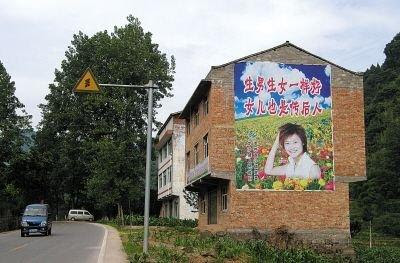"Caring" Propaganda Instead
The Taipei Times shared this headline yesterday:
Ones that still stand and read things like
“Kill all your family members if you don’t follow the rule” and
“If you don’t have your tubes tied, your house will be demolished.”
The article mentions a sign that reads “Once you are captured, your tubes will be tied. Should you escape, we’ll hunt you down. If you attempt suicide, we’ll offer you either the rope or a bottle of poison.”
This is real stuff.
China’s National Population and Family Planning Commission wants to prevent “zealous local authorities from offending the public or worsening social tensions with ‘nasty’ slogans.”
Instead, they want them to continue to uphold the one-child policy but use “caring” verbiage that will not offend and also helps battle the gender imbalance that China’s one-child policy has become known for.
China Bans "Orphan" Names
Rich in meaning. Rich in visual art form.
Chinese names intrigue me.
I’ve heard some beautiful ones that bring a tear to my eye. And, some very unbeautiful ones that bring a tear to my eye.
Orphans named for their special need–a name that means “blue mouth” for a child suffering from cyanosis due to a heart defect or “missing arm.” Or, perhaps worse, orphans named by some institution staff member for their orphan status alone–for example, a name that means “found with a note.”
As if living in an orphanage is not enough of a reminder of the loss, the child forever carries the stigma of being without a family through his or her name. In a culture where names can define you, they are forever defined as unwanted.
A 32 year-old Chinese woman born missing her hand was abandoned at a few days old in Datong City in Shanxi. She was given the name Dang Ye, meaning she was a ward of the state, cared for by the Party. Later adopted by a Chinese family, they added their surname but kept the name the orphanage gave her.
Even now, as a successful university lecturer, she regrets the name she carries and the story, her story, which is revealed through it.
A lot of people could not help digging up my past when they saw my name for the first time, and then they expressed sorrow or contempt, which made me really upset.
According to China Daily, China’s Ministry of Social Affairs is working so that this doesn’t happen anymore. By the end of this year, they aren’t going to allow political names indicating that the child is in the care of the Party. They aren’t going to allow names that tell the story of the child’s abandonment. And, I’m hoping they too won’t allow names describing a child’s special need.
Because the children in China without families are not defined by their losses. They are more than their losses. They are perfectly created, known by their maker, and not without hope. And, while most have to carry a name given by an orphanage worker rather than the man and woman who held them when they took their first breath, at least they will no longer have to carry a name that brings shame and forever labels them as rejected.
Why I Do It
Every Sunday, after church, we eat a quick lunch and out we go. I leave loads of laundry to be folded, dirty dishes in the sink, and a husband I’d love to sit and talk to on a lazy Sunday afternoon. And, I take Ashlyn to Chinese school at MLCCC.
I sit behind her for 2 hours and listen to words I do not understand and then walk her down the hall to watch for another hour as she giggles along with 8 dark-haired beauties her age as they learn fan dancing and other Chinese traditional dances.
So, why do I do it week in and week out?
She wanted to.
We waited to bring our daughter home for a long time (3 years to be exact). During that time, Ashlyn fell in love with all things Chinese. Soon after we were home with her new sister, Ashlyn (age 6 at the time), asked me if she could learn Chinese.
Know what I said?
“I don’t think so.” (I know, mother of the year) I knew it would be hard. I thought it would be expensive. I knew it would mean a big commitment–frankly, a commitment for me that I didn’t want to make.
But, she didn’t let up.
“You know, you might be the only one there who isn’t Chinese.”
Didn’t matter. She wanted to do it. So, eventually, I caved. And, our Sundays changed.
And, in so doing, I found that this was where we were supposed to be. For Ashlyn. For our family.

When we walk through those doors every Sunday afternoon, we are reminded of a new community we now live in, one that looks different from us and speaks different from us, but one that has welcomed us in.
And, I’ve learned that as much as our Chinese daughter is now American, we’ve also all become just a little bit Chinese. And, I’m loving my Chinese-ness.

Now, I’m one of those adoptive parents who is signing her child up early for language classes. Lydia will be 3 this March. And, as soon as her afternoon nap schedule is done (no need to haste the day!), she’ll be a part of the preschool program there. Maybe she’ll learn a few words, phrases, and a song or two. But, more importantly, she’ll know too that she’s a part of this community. And, I know that her knowing that and building relationships here is way more significant for her cultural identity formation than all the festivals we could attend (like the one pictured here at Villanova University this past week), a dragon cake every year, and a library of wonderful children’s books (want proof?).
Laundry and dishes can wait. Sunday afternoons are for community.













